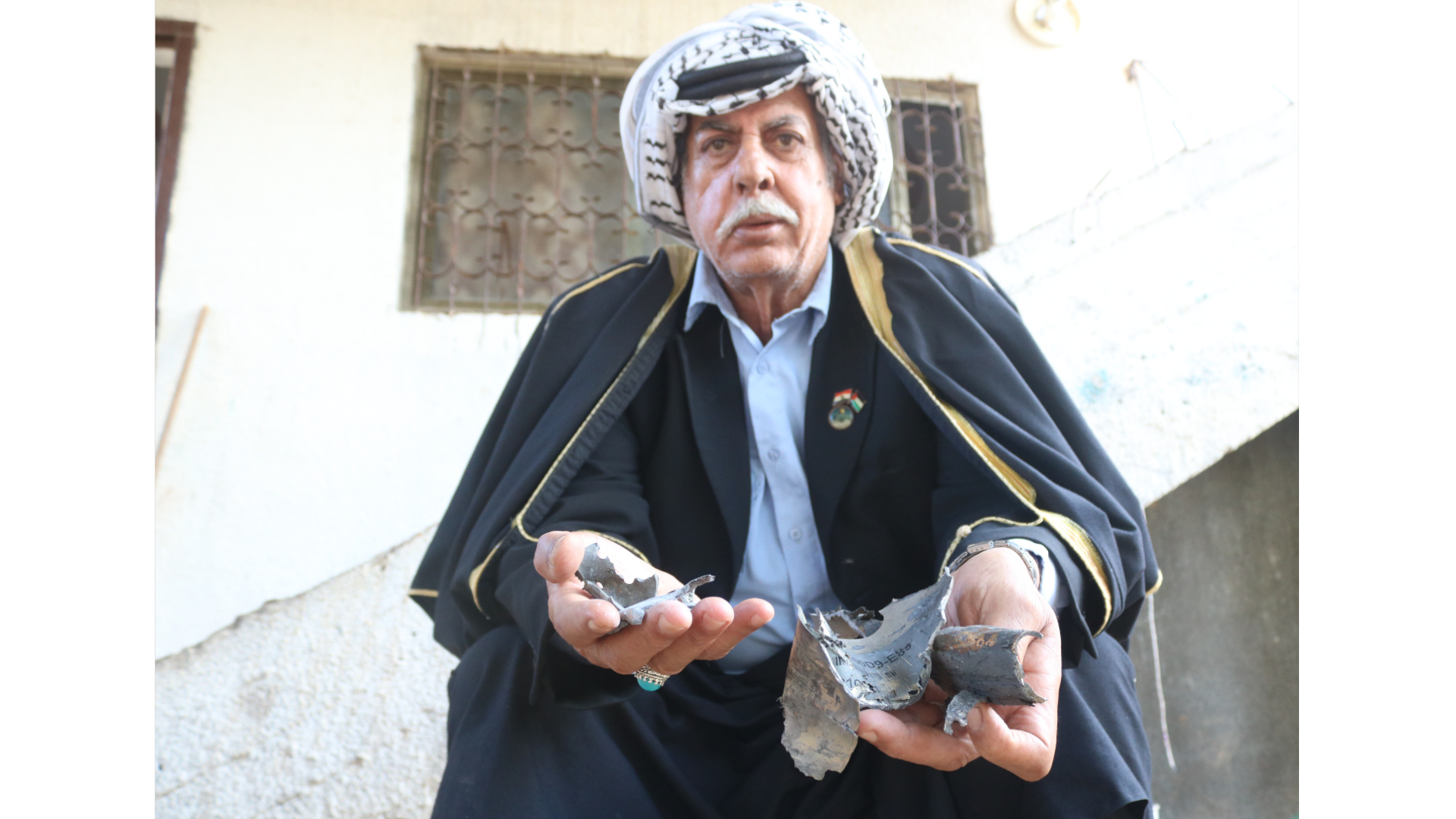Israel's Iron Dome Hurts Gaza Familes

Hamza al-Masri, 71, was smoking a pipe in his backyard in Beit Hanoun in the northern Gaza strip, just a few hundred meters away from the Israeli blockade.
Al-Masri is a father to 44 children by five wives, and a grandfather to more than 400, most of whom live nearby in asbestos-roofed houses, while others reside in caravans.a
The location of their homes means that when Israel’s famed Iron Dome intercepts any rocket launched from the northern Gaza strip, the shrapnel often falls directly on residents’ houses, causing injuries and creating alarm for the people inside.
This is how a supposedly “defensive” shield has become yet another form of weapon against ordinary Gazans.
“Iron Dome shrapnel has turned our lives into hell,” Al-Masri said.
He says he and ten of his children were injured last year from Iron Dome shrapnel.

“The shrapnel fell on us, causing holes in our houses’ asbestos roofs, and breaking the windows,” al-Masri said, surrounded by his grandchildren.“Last war many of them fell on us. My back was injured. My sons quickly moved my elderly, ill wives and their children into cement houses.”
Of course, the violence is not all caused by the Iron Dome. Al-Masri’s son, Habib, was shot and killed in 2019 during the Great March of Return, and their houses have been damaged repeatedly during the previous wars, forcing them to take shelter at UNRWA schools.
Still, the shrapnel is causing serious injury and damaging property, while disposing of it is creating huge problems for Gaza’s already-besieged explosion services. The Explosion Engineering Department at the Ministry of Interior and National Security in Gaza said they received 32 calls from people regarding Iron Dome shrapnel during the last Israeli assault in May 2023, most of which originated in the northern area, and carried out more than 300 field missions to tackle different types of Israeli bombs.
The 16-year Israeli blockade on Gaza has created a dire situation where explosion department crews are unable to carry out their duties effectively due to the lack of necessary equipment. They have faced a particular challenge in disposing of the Iron Dome missiles as its constituents are not always known.
UNMASS (United Nations Mine Action Service), the International Committee of the Red Cross, and other international bodies have been appealed to in order to exert pressure on Israel to permit entry of the equipment needed to dispose of the unexploded bombs, but with no success.

An Echo of a Scream
This situation leaves parents in Gaza, who are already struggling to protect their children, even more powerless. Bilal Abu Jamee, a father of four, was sleeping near his children on May 11, Day Two of Israel’s four-day assault on the Strip, when they heard a deafening sound and the thud of something landing on the roof of their house, a few hundred metres away from Israel’s blockade barrier near Khan Younis.
“My children were screaming and crying. I was scared to go up to the roof,” he said. “I looked out the door and saw smoke and broken stones on the stairs.”
The 37-year-old was unwilling to leave with his family as it was 4am and he feared that they might be targeted by an Israeli drone or sniper. Instead, they waited until dawn to flee.
“We grabbed our stuff and called the explosion department before escaping,” Abu Jamee added.
When returning two days after the ceasefire began, he found holes in the roof and water tanks.
“My children still cry and scream whenever they hear the interception sound of the Iron Dome,” said Abu Jamee.
Scared to Flee
Last May, while Israel bombed Gaza and received rocket fire in return, Khalil Arafat, also a father of four, stood at the doorstep of his house with his brother-in-law and his pregnant wife. The two were about to flee by car, seeking refuge in an UNRWA school, as many Gazans do during these regular assaults on the impoverished strip, when an Iron Dome missile exploded in front of his house.
“When we heard the explosion my brother-in-law and his wife rushed to the car and fled, and I hurried into my house without thinking. My son had fallen down the stairs. Many windows were broken,” he said.
The deafening sound of explosions reverberated through the area, leaving women and children, already rattled by sudden and unpredictable Israeli bombings, particularly distressed.
“The last two days in the [May 2023] war were scary. The Iron Dome missiles' shrapnel was spread indiscriminately in the sky,” said Arafat. “It was harrowing - we were scared to leave the house.”


